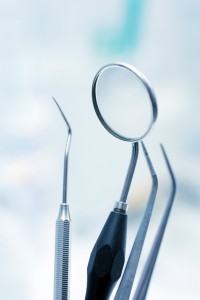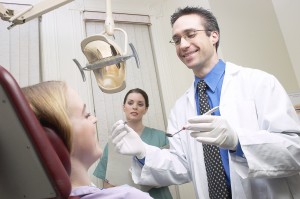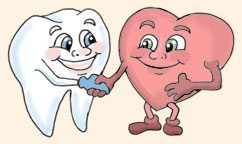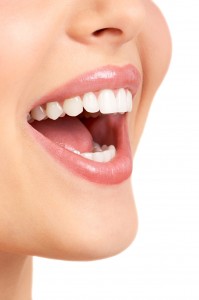 For many patients, dental anxiety is a very real issue. Every year, it keeps many people from seeking the important care their smiles needs. But the good news is that dental anxiety can be overcome. In some cases, your dentist may offer soothing options to help ease your fears. But if not, here are some tips you can follow yourself to ease your own stress.
For many patients, dental anxiety is a very real issue. Every year, it keeps many people from seeking the important care their smiles needs. But the good news is that dental anxiety can be overcome. In some cases, your dentist may offer soothing options to help ease your fears. But if not, here are some tips you can follow yourself to ease your own stress.
- Don’t be afraid to tell your dentist. The more he or she knows about your anxiety, the more their dental team can do to help you feel welcome and at home.
- Avoid caffeinated beverages, as these can increase your feelings of nervousness.
- Avoid high-stress traffic situations by arriving early to your appointment.
- Find out if your dentist offers nitrous oxide, better known as laughing gas.
- Breathe deeply during appointment. By breathing deeply, you can help yourself stay calm and relaxed while your dentist helps your smile.
- Find out all you can about your treatment. The more you know the less afraid you have to feel about your own oral care.
To find out more about how you can combat dental anxiety, call your dentist with your questions. Dental anxiety is a real condition, but it doesn’t have to keep you from having the kind of strong, healthy smile you’ve always dreamed of.
 You know how it goes: you visit the dental office, and your dentist tells you to floss more often. Perhaps your dentist finds a spot of mild gum disease, giving you even more reason to start flossing regularly. The truth is, you really can’t maintain long-term oral health without flossing. Brushing and using mouthwash play a big role in a healthy smile, but nothing gets between teeth and below the gum line like flossing.
You know how it goes: you visit the dental office, and your dentist tells you to floss more often. Perhaps your dentist finds a spot of mild gum disease, giving you even more reason to start flossing regularly. The truth is, you really can’t maintain long-term oral health without flossing. Brushing and using mouthwash play a big role in a healthy smile, but nothing gets between teeth and below the gum line like flossing. High blood pressure, also called HBP or hypertension, can affect your ability to receive oral healthcare. Performing dental treatments on patients with hypertension can be detrimental! If your blood pressure is too high, many dentists won’t schedule procedures until you receive a health assessment from your medical doctor.
High blood pressure, also called HBP or hypertension, can affect your ability to receive oral healthcare. Performing dental treatments on patients with hypertension can be detrimental! If your blood pressure is too high, many dentists won’t schedule procedures until you receive a health assessment from your medical doctor. No matter your age, your profession, or how busy your schedule might be, finding a good dentist is one of the most important things you can do. It can also be a struggle. So, how can you get started? What should you keep in mind as you look for a dentist for yourself and your family? Here are five things to consider.
No matter your age, your profession, or how busy your schedule might be, finding a good dentist is one of the most important things you can do. It can also be a struggle. So, how can you get started? What should you keep in mind as you look for a dentist for yourself and your family? Here are five things to consider. cancer, and testicular cancer put together. But the more you learn about oral cancer and its signs and symptoms, the better able you’ll be to get an early diagnosis and more effective treatment should oral cancer happen to you. Oral cancer responds very well to treatment in the earliest stages.
cancer, and testicular cancer put together. But the more you learn about oral cancer and its signs and symptoms, the better able you’ll be to get an early diagnosis and more effective treatment should oral cancer happen to you. Oral cancer responds very well to treatment in the earliest stages. Nearly 80% of American adults suffer from gum disease! Gum disease can devastate your oral health, causing serious dental problems. In fact, the number one reason for adult tooth loss in the United States is untreated gum disease. Worse, though, is the effect that gum disease can have on your heart health.
Nearly 80% of American adults suffer from gum disease! Gum disease can devastate your oral health, causing serious dental problems. In fact, the number one reason for adult tooth loss in the United States is untreated gum disease. Worse, though, is the effect that gum disease can have on your heart health. You already know how important brushing and flossing are for the health of your smile. But did you also know that certain foods can benefit your oral health too? Any number of specific foods can be beneficial, but today we’re targeting just a few general foods or drinks that can help you.
You already know how important brushing and flossing are for the health of your smile. But did you also know that certain foods can benefit your oral health too? Any number of specific foods can be beneficial, but today we’re targeting just a few general foods or drinks that can help you.
 Parents have been telling their children to brush their teeth for at least 6,000 years. Archaeological excavations have uncovered evidence of ancient tooth cleaning implements, including twigs, feathers, bones, and quills. In fact, tooth brushing tools have been found as early as 3500 BCE in the Babylonian and Egyptian cultures, when people used frayed ends of twigs to scrub off bacteria and food particles.
Parents have been telling their children to brush their teeth for at least 6,000 years. Archaeological excavations have uncovered evidence of ancient tooth cleaning implements, including twigs, feathers, bones, and quills. In fact, tooth brushing tools have been found as early as 3500 BCE in the Babylonian and Egyptian cultures, when people used frayed ends of twigs to scrub off bacteria and food particles. January is a time when many people are thinking about fresh starts and life improvements. If that sounds like something you’re doing, have you considered a smile makeover from your dentist?
January is a time when many people are thinking about fresh starts and life improvements. If that sounds like something you’re doing, have you considered a smile makeover from your dentist?